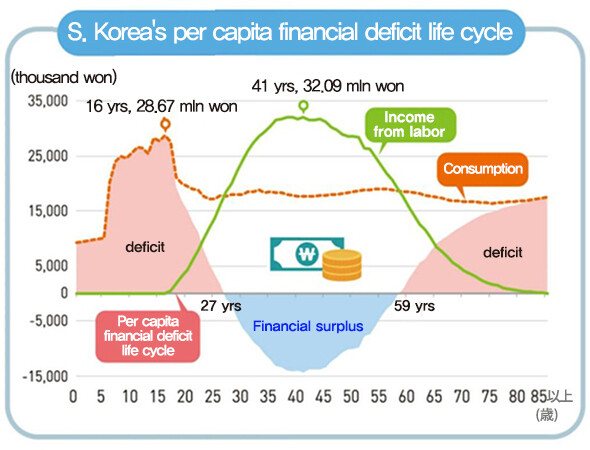hankyoreh
Links to other country sites 다른 나라 사이트 링크
Average S. Korean enjoys only 32 years of a financial surplus in lifetime
South Koreans arrive at a “life surplus” — that is, when their income is higher than their spending — at the age of 27, their surplus peaks at the age of 41, and they revert to a deficit at the age of 59, newly released figures show.
Statistics Korea released the 2016 National Transfer Accounts on Dec. 9, which found that, in terms of per capita life cycle, Koreans faced a deficit between the ages of 0 to 26 and then again after age 59, with their surplus lasting from 27 to 58, backed by rising wages. The conclusion is that Koreans only enjoy a financial surplus for 32 years in their entire life, with expenses exceeding income for the rest of their time.

The surplus period in the 2015 National Transfer Account, which was released in January 2019, lasted for 29 years (from 29 to 57). This means that the surplus period increased by three years in the space of a single year.
“The apparent factor here is that people are working longer and retiring later because of the aging of our society,” said an official with Statistics Korea. The greatest deficit in the per capita life cycle came at the age of 16, at 28.67 million won (US$24,052), with the greatest surplus at the age of 41, at 14.35 million won (US$12,038).
People are supported during these long periods of deficit — when spending exceeds income — through the help of the state and their families. The income of the working-age population (between the ages of 15 and 65) is transferred to children (0-14 years) and the elderly (65 years and above) through public transfers, meaning the state’s welfare system, and through private transfers, generally referring to assistance among family members. Transfers to children were valued at 132.4 trillion won (US$11.07 billion), and transfers to the elderly at 74.4 trillion won (US$62.42 billion). Children received more in private transfers (74.4 trillion won, or US$62.42 billion) than in public transfers (58 trillion won, or US$48.66 billion), while the elderly received more in public transfers (54.8 trillion won, or US$45.97 billion) than in private transfers (19.6 trillion won, or US$16.44 billion).
Because of societal aging and the expansion of the welfare system, the public sector is playing a bigger role, the figures show. When the total amount of cash and other resources transferred to each age group is considered, public transfers in 2016 amounted to 112.7 trillion won (US$94.55 billion), exceeding the 99 trillion won (US$83.06 billion) in private transfers. Significantly, public transfers have grown by just over 38 trillion won (US$31.89 billion) since 2010, from 74 trillion won (US$62.08 billion), while private transfers have only increased by 71.5 trillion won (US$59.9 billion), up from 91.5 trillion won (US$76.77 billion).
“Public transfers, which collect taxes and then return them as welfare benefits, have essentially surpassed the scale of private support through family relationships. Amid increasing welfare for the elderly, who depend more on public than private transfers, we’re seeing public transfers increase at a higher rate,” said Kim Dae-yu, head of income statistics development at Statistics Korea.
First published in January 2019, National Transfer Accounts are an index that helps identify how demographic changes and other factors are driving trends in the distribution of resources to each age group. Compiling these statistics is very time-consuming, requiring the calculation of income levels, spending levels, public transfers, and private transfers both within and between households for each age group across the entire population. As such, there’s a three year delay between the period covered by the statistics and the date of publication.
“We’re reviewing ways to reduce the delay in order to make the statistics more relevant for effective policy making,” Kim said.
By Noh Hyun-woong, staff reporter
Please direct comments or questions to [english@hani.co.kr]

Editorial・opinion
![[Column] Park Geun-hye déjà vu in Yoon Suk-yeol [Column] Park Geun-hye déjà vu in Yoon Suk-yeol](https://flexible.img.hani.co.kr/flexible/normal/500/300/imgdb/original/2024/0424/651713945113788.jpg) [Column] Park Geun-hye déjà vu in Yoon Suk-yeol
[Column] Park Geun-hye déjà vu in Yoon Suk-yeol![[Editorial] New weight of N. Korea’s nuclear threats makes dialogue all the more urgent [Editorial] New weight of N. Korea’s nuclear threats makes dialogue all the more urgent](https://flexible.img.hani.co.kr/flexible/normal/500/300/imgdb/original/2024/0424/7317139454662664.jpg) [Editorial] New weight of N. Korea’s nuclear threats makes dialogue all the more urgent
[Editorial] New weight of N. Korea’s nuclear threats makes dialogue all the more urgent- [Guest essay] The real reason Korea’s new right wants to dub Rhee a founding father
- [Column] ‘Choson’: Is it time we start referring to N. Korea in its own terms?
- [Editorial] Japan’s rewriting of history with Korea has gone too far
- [Column] The president’s questionable capacity for dialogue
- [Column] Are chaebol firms just pizza pies for families to divvy up as they please?
- [Column] Has Korea, too, crossed the Rubicon on China?
- [Correspondent’s column] In Japan’s alliance with US, echoes of its past alliances with UK
- [Editorial] Does Yoon think the Korean public is wrong?
Most viewed articles
- 1‘We must say no’: Seoul defense chief on Korean, USFK involvement in hypothetical Taiwan crisis
- 2Will NewJeans end up collateral damage in internal feud at K-pop juggernaut Hybe?
- 3[Column] Park Geun-hye déjà vu in Yoon Suk-yeol
- 4Why Korea shouldn’t welcome Japan’s newly beefed up defense cooperation with US
- 5Thursday to mark start of resignations by senior doctors amid standoff with government
- 6N. Korean hackers breached 10 defense contractors in South for months, police say
- 7[Guest essay] The real reason Korea’s new right wants to dub Rhee a founding father
- 8[Column] ‘Choson’: Is it time we start referring to N. Korea in its own terms?
- 9Kim Jong-un expressed ‘satisfaction’ with nuclear counterstrike drill directed at South
- 10[Editorial] New weight of N. Korea’s nuclear threats makes dialogue all the more urgent